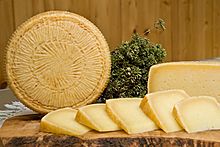Pecorino di Filiano facts for kids
Quick facts for kids Pecorino di Filiano |
|
|---|---|
 |
|
| Country of origin | Italy |
| Region | Basilicata |
| Source of milk | Sheep |
| Pasteurised | No |
| Texture | Hard |
| Aging time | Minimum 180 days |
| Certification | PDO, 2007 |
Pecorino di Filiano is a special kind of cheese that comes from the Basilicata region in Italy. It's a firm, hard cheese made using milk from sheep. This cheese is so unique and traditional that it received a special protection status called PDO in 2007. This means only cheese made in a specific way and place can be called Pecorino di Filiano!
Contents
What is Pecorino di Filiano?
Pecorino di Filiano is a delicious cheese with a rich history. The word "Pecorino" comes from the Italian word "pecora," which means "sheep." So, right away, you know this cheese is made from sheep's milk, not cow's milk. It has a firm texture, meaning it's not soft and gooey, but rather solid and can be grated or sliced.
Where Does It Come From?
This unique cheese is made in the province of Potenza, which is part of the Basilicata region in southern Italy. Many towns in this province are involved in making Pecorino di Filiano, including Filiano, Potenza, and Melfi. The special climate and traditional methods in this area help give the cheese its distinct flavor.
How Is It Made?
Pecorino di Filiano is made using traditional methods that have been passed down through generations. The sheep's milk used is not pasteurized, which means it hasn't been heated to kill bacteria. This helps keep the natural flavors and good bacteria that are important for the cheese's taste and texture. After the cheese is formed, it needs to age for at least 180 days, which is about six months. This aging process is what gives the cheese its firm texture and deep, rich flavor.
Pecorino di Filiano Festival
Every year, the town of Filiano celebrates this amazing cheese with its very own festival! On the first Sunday of September, people gather to enjoy the Pecorino di Filiano festival. It's a great chance to taste and buy the cheese directly from the farmers who make it. It's a fun way to experience the local culture and see how important this cheese is to the community.
 | Frances Mary Albrier |
 | Whitney Young |
 | Muhammad Ali |

